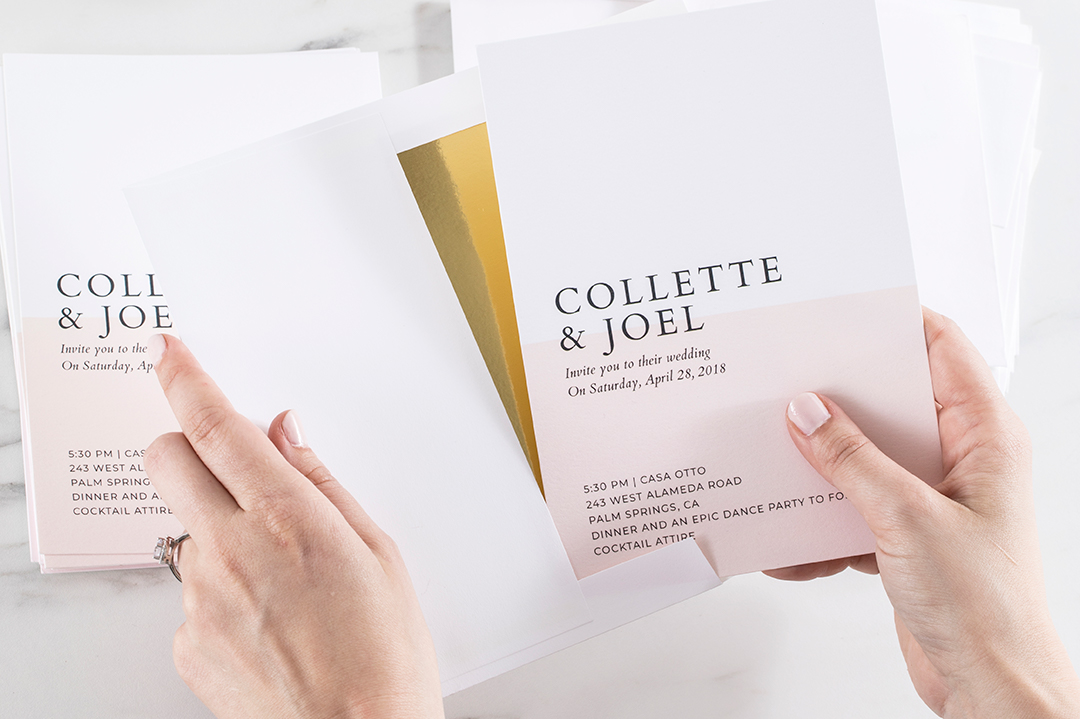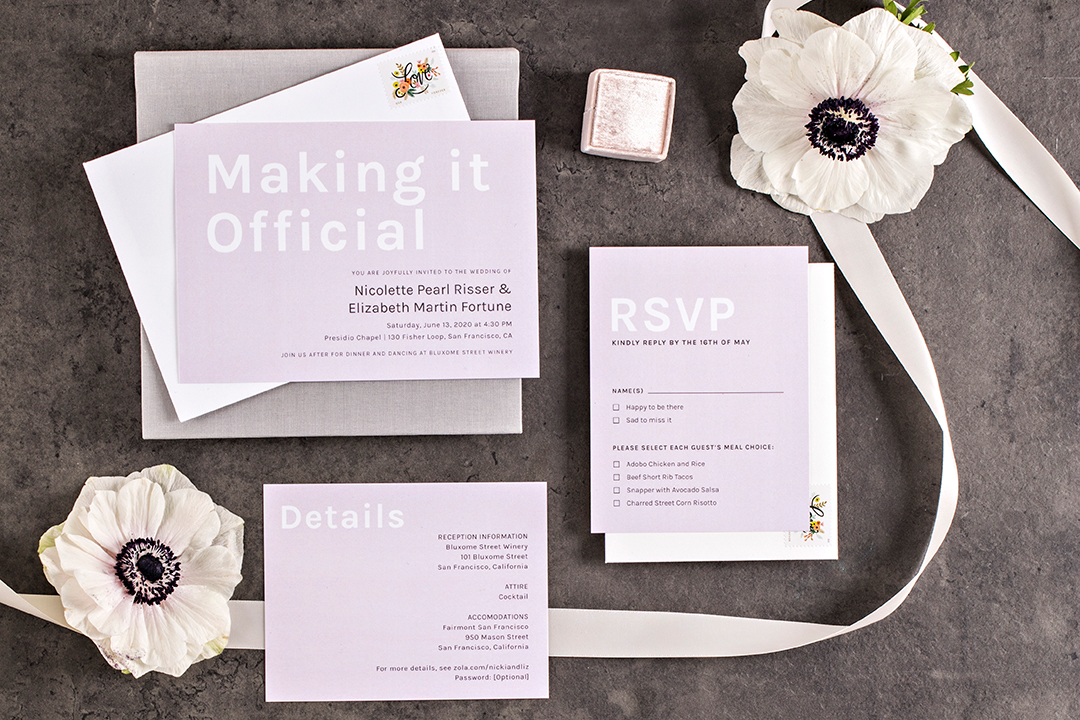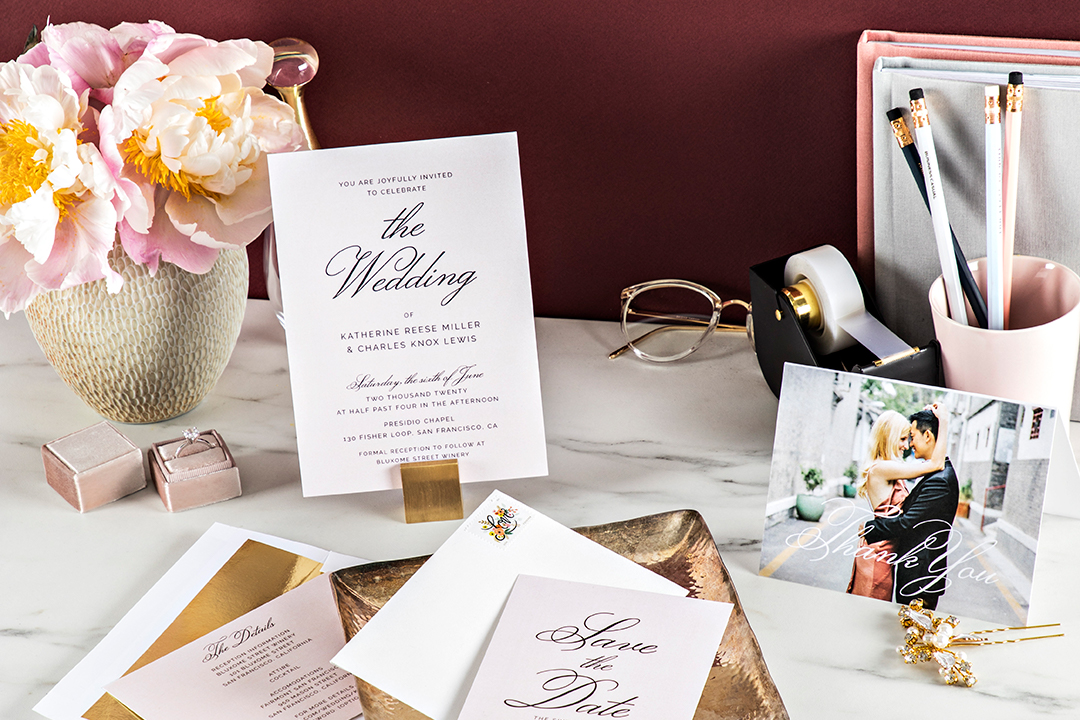- Expert advice/
- Wedding planning 101/
- Wedding planning questions/
- Should We Send a Wedding Invitation to Someone We Know Can’t Come?
- Wedding planning questions
Should We Send a Wedding Invitation to Someone We Know Can’t Come?
If you know a guest can't come to your wedding, you probably think you don't have to send an invite. Think again. Here's when to send an invite to someone who can't attend the wedding—and when not to.
Last updated February 5, 2024

Numerous questions regarding wedding planning end up coming down to wedding etiquette. This, of course, applies to even your wedding invitations. With timelines, guest lists, RSVP deadlines, wedding invitation wording, and more to consider, it can be difficult to keep track of what’s considered good manners and protocol. To avoid any confusion or unintentional offenses, we’ve answered the most common (and pressing) wedding invitation etiquette questions. Read on before finalizing your paper suites and sending them on their way.
Wedding Invitation Etiquette FAQs
1. When should invitations be sent out?
One of the biggest wedding invitation mistakes is not letting your wedding guests know with enough advance as to when your wedding date will be. As a courtesy to your guests (and whoever’s a part of making your wedding happen), invitations should be sent out six to eight weeks beforehand, at the latest. This will give your guests enough time to double check their calendars and set up accommodations, if need be. If you’re having a destination wedding, send invitations out further in advance—we suggest twelve weeks. Also, if you have guests coming in from far and wide for your wedding ceremony, consider sending them out earlier than the standard six to eight weeks prior. You can never give guests too much notice.

2. How long should the RSVP deadline be?
Each of your invitation suites should include either an RSVP insert or RVSP information directly on the invitation. Included in this information is your RSVP deadline. Setting a realistic deadline is paramount when it comes to finalizing your wedding day details. Depending on the size and style of your wedding celebration, the day you absolutely need a final headcount will vary. That being said, you’ll want to make it at least three to four weeks before your date. Doing so gives you and your vendors (caterers, florists, and the like) enough leeway to get an accurate count and prepare any last-minute details accordingly.
Along with your deadline, let guests know how to RSVP. Include a pre-addressed and stamped envelope in your invitation suite so that they can mail back a reply card, or direct them to a phone number, email address, or wedding website (if online RSVPing is an option) where they can respond.
3. How do we remind guests of the RSVP deadline?
If your RSVP date is approaching (or has passed) and you haven’t heard back from a few people, it’s completely appropriate to remind them. Before panicking, remember that everyone gets busy and it’s nothing personal. Sometimes people just need a gentle reminder. Depending on how much time you have until your wedding, wait one to two weeks after your deadline to start nudging guests. At that point, you can go line by line down your guest list and start personally seeking out responses.
How you go about this depends on your relationship with each person. If someone’s a close friend or family member that you see often, simply ask them in person. For more distant relatives or friends that you don’t see as much, inquiring through a quick phone call, text, or email should do the trick. As for parents’ friends, or those with a similar connection, ask the groom’s parents or bride’s parents (or whomever your mutual connection is) to reach out, as necessary.
Social media is even an option. For example, if you see someone who hasn’t responded yet posting on their Instagram stories, shoot them a DM. Just be sure to avoid any public pages or group messages that could reach friends (or followers) that weren’t invited.
4. How should plus-ones be given?
Avoid awkward calls and emails asking about plus-ones by making it clear on your formal invitation whether or not someone gets the option of a guest. Do this by addressing invitations to exactly who’s invited. For example, if a sibling’s significant other is invited and you know his or her name (or you can ask for it), write it out alongside your sibling’s name on both the outer envelope and inner envelope. If you’re allowing certain guests a plus-one of their choosing, address the wedding invitation suite to his or her name “and Guest.”
Another way that you can make plus-ones clear is by including, “___ seat(s) have been reserved in your honor” on your RSVP card. Write one if no plus-one is given, two if one plus-one is given, and so on. If you’re worried about people getting confused about the invitation wording or bringing someone without asking, make it crystal clear. Have, “We can only accommodate the individual(s) named on the envelope. No plus-ones, unless clearly designated,” or similar printed on your RSVP card or an informational insert. Be as specific as possible when it comes to the invitation wording.
To recap:
-
“John Doe and Jim Dear,” is appropriate if you’re inviting someone and a specific plus-one (ie. a significant other).
-
“John Doe and Guest,” is appropriate if you’re giving someone a plus-one.
-
“Two seats have been reserved in your honor,” is appropriate on a RSVP insert if you’re giving someone a plus-one.
5. How can we indicate that we don’t want kids at our wedding?
Be sure to properly and carefully address invitations if you’re having a kid-free wedding and reception. Avoid addressing envelopes to “The Doe Family” and, instead, address the parent or sets of parents’ full names on the envelope. You can also make this clear by writing or printing the exact names of the invited guests on the response card. What we discourage you from doing is putting “Adults Only” or “No Children” on your invitations. You shouldn’t feel guilty for planning a kid-free affair, but it isn’t tactful to state that outright. Instead, if you feel compelled to, clearly express this detail on your wedding website.
As a thoughtful gesture, consider hiring a babysitter where your guests are staying for the duration of your wedding.
6. How do we talk about the dress code?
Everyone’s personal style is different, so it’s important that you’re clear about the level of formality you want at your wedding. There are two ways you can spread the word—on an insert within your invitation suite, or on your wedding website (if not both). Simply dedicate a space to detailing how you’d prefer your guests to dress. Remember to take the projected weather and your venue’s terrain into account.
Here’s a list of dress categories, from most to least formal:
-
White tie
-
Black tie
-
Formal
-
Semi-formal
-
Cocktail attire
-
Destination (think beach or garden)
-
Casual
7. Do we include our registry or wedding website link? Where?
Including your registry information on your formal invitation is a bit of a faux pas; however, including your wedding website URL is more widely accepted. This is because your website isn’t just a go-to for gifts, but rather a hub for everything that your guests should know leading up to your wedding. It can also link to your registry, so don’t worry—it’s a roundabout way of getting it out there. Just have an easy to locate registry tab or link on your website.
As for your website’s URL, there are a few places where you can share it. The most popular option is save the dates, but you can also place it on a details card, wedding website card, or RSVP card. Only opt for the latter if you’re making online RSVPing an option. A general rule of thumb: Before including your website link in your invitation suite, ask if it’s serving more of a purpose than broadcasting where guests can purchase gifts.
8. How do we ask for cash, instead of gifts?
Like your registry, don’t include this information directly on your wedding stationery. Instead, create one or several cash funds within your Zola registry. Since your registry is linked to your wedding website, guests will easily be able to locate them there. As a courtesy, be clear as to how you plan on spending the gifted money. For example, have crush funds dedicated to something broad, such as your honeymoon, or more specific, such as a certain excursion or activity. Guests will feel more comfortable (and excited) knowing what they’re contributing to.
Don’t be hesitant to use word of mouth, either. Tell your friends and family (either in person or over the phone) that you’re registering for cash funds and offer details about what it’ll go towards. Your guests want to gift you what you want—especially if they hear it straight from the source.
9. Should I send a wedding invitation to someone I know can’t come?
Generally speaking, if this person is a close friend or family member, and someone that you know you would want to invite regardless of whether they actually come, you should still send an invite. It’s a nice gesture.
Remember that, while a wedding is a great opportunity for a party, it’s ultimately about affirming your love for your partner in front of all your closest friends and family. When you’re in the throes of number-crunching (an open bar for 150 people costs how much!?) and wedding planning, it’s easy to forget why you wanted a wedding in the first place.
They’re inherently intimate affairs, no matter the actual size. So, chances are, it’ll be meaningful to your friend or family member to receive an invite in the mail even if it’s impossible to attend.
What if they think I’m trying to get an extra gift?
If you’re worried that sending an invite will look like a gift grab, rest assured that your friend or family member probably planned to gift you something, anyway. Sending them an invitation allows them to to see your wedding website info and send you something more discreetly. The etiquette here goes both ways. It’s not uncommon to send a gift for a wedding you can’t attend. So, if you’re close to this person, you can pretty safely assume they want to get you a gift, anyway.

Does sending an invite mean I should logistically still plan for them to come?
Not necessarily—this is a case-by-case situation. You never know: Plans can change. If the person’s schedule opens up (surgery gets rescheduled, vacation plans get pushed back, or a baby even makes an early arrival), you’ll want him or her there with you to celebrate. Sending the invite makes that clear.
That said, don’t include this guest in your seating chart or final catering count without knowing fully if they can or can’t attend. An invite keeps them in the loop, but be sure to touch base about their plans as you finalize logistical details.
10. Is there anyone I shouldn’t send an invite to?
Now for the exception: If, after receiving your safe the date card, someone has informed you that they can’t attend your wedding and you’re not particularly close (e.g. your mom’s boss or a distant cousin), you can skip the invite. Chances are, they won’t be offended. It’s the one case where they might see the invite as a bit of a gift grab.
But, for the most part, don’t worry about it. Your close friends and family will appreciate the gesture for what it is: A reminder that you love and are thinking of them leading up to your big day.
Now that you know all things invitation etiquette, it’s time to get to work on your invitations. Don’t worry, we have a variety of customizable templates to get you started. With invitation designs ranging from formal wedding appropriate to trending and less formal, there’s a ceremony and reception card for every couple. It’s never been easier to say, “We request the pleasure of your company.”
- Expert advice/
- Wedding planning 101/
- Wedding planning questions/
- Should We Send a Wedding Invitation to Someone We Know Can’t Come?
Find even more wedding ideas, inspo, tips, and tricks
We’ve got wedding planning advice on everything from save the dates to wedding cakes.
